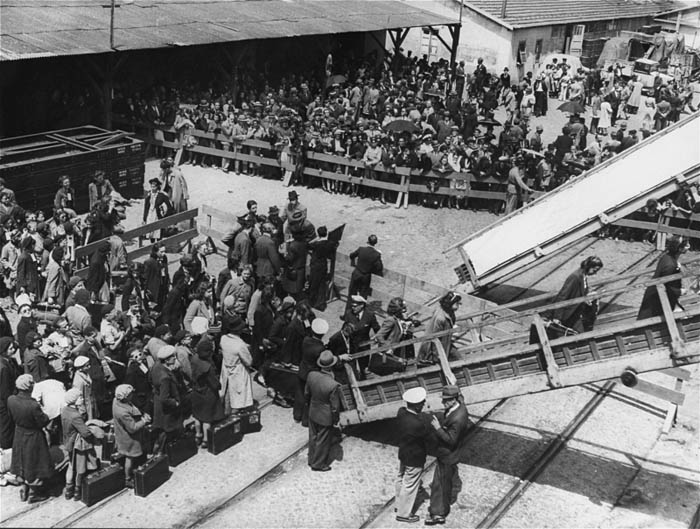Human Nature/The Lessons of History
"Silently, with no lights on, cars kept coming, one after the other, full to bursting with baggage and furniture, prams and birdcages, packing cases and baskets of clothes, each with a mattress tied firmly to the roof. They looked like mountains of fragile scaffolding and they seemed to move without the aid of a motor, propelled by their own weight down the sloping streets to the town square. Cars filled all the roads into the square. People were jammed together like fish caught in a net, and one good tug on that net would have picked them all up and thrown them down on to some terrifying river bank."
"They look so tired, so hot!" everyone kept saying, but not one of them thought to open their doors, to invite one of these wretches inside, to welcome them into the shady bits of heaven that the refugees could glimpse behind the houses, where wooden benches nestled in arbours amid currant bushes and roses. There were just to many of them, too many weary, pale faces, dripping with sweat, too many wailing children, too many trembling lips asking "D you know where we could get a room? A bed?"... "Would you tell us where we could find a restaurant, please Madame?" It prevented the townspeople from being charitable. There was nothing human left in this miserable mob; they were like a herd of frightened animals. Their crumpled clothes, crazed faces, hoarse voices, everything bout them made them look peculiarly alike, so you couldn't tell them apart. They all made the same gestures, said the same words."
"They hadn't yet been shelled. When it happened, they didn't know what was going on at first. They heard the sound of an explosion, then another, then shouting: "Run for it! Get down! Get down on the ground!" They immediately threw themselves face down."
"The people arriving off trains would ask, "Is it an air raid?" and be told, "No, it's over", only for the faint bell to be heard again five minutes later. There was laughter. Shops were open, little girls played hopscotch on the pavement and dogs ran through the dust near the old cathedral. The Italian and German planes were ignored as they glided calmly overhead. People were used to them. Suddenly, one broke loose and swooped down at the crowd. He's going to crash, no he's going to fire, he's firing, we're finished.. The bombs had fallen on the train station and, a bit further along, on the railway tracks. The glass roof shattered and exploded outwards, wounding and killing the people in the square. Panic-stricken, some of the women threw down their babies as if they were cumbersome packages and ran. Others grabbed their children and held them so tightly they seemed to want to force them back into the womb, as if that were the only truly safe place."
Irene Nemirovsky, Suite Francaise

An old manuscript, never published, was unearthed, its contents digested by a relative, then finally published seventy years after it was written painstakingly by hand, under a dire and constant threat, during the Second World War by an emigrant whose Jewish family from Ukraine had sought haven in France during the Russian Revolution, but whom the Nazi juggernaut caught up with, when the writer was deported to Auschwitz, where she died in 1942.
Irene Nemirovsky, a Sorbonne graduate, had attained some measure of fame as a novelist with her succession of novels in France. The world knows her now as the author of Suite Francaise, a moving account of the panic and fear that enveloped the French when they were forced to understand that the impossible had occurred; their defending French military had been defeated by the advance of the Axis military.
She described the suffering of ordinary civilians fleeing their fears of occupation and death, and meeting it when German and Italian warplanes flew over congested highways packed with terrified migrants, bombing and strafing, or awaiting the arrival of trains to take them further into the countryside and imagined safety, only to have them bombed, and they within the rail stations.
Reading her novelistic account of the history of the time during the Nazi invasion of France, turns the reader's mind to the dreadful suffering of the Syrian people at the present time, caught between an armed insurrection comprised of rebel forces contesting the legitimacy of the Alawite Baathist regime of President Bashar al-Assad whose war machine answers the challenge of those they describe as "terrorists" by aiming their deadly artillery at their own civilian populations.
That there are indeed within the forces of the rebels, jihadists whose deadly pursuit of extreme violence to be committed against all those whose brand of Islam does not match their own, and who victimize people indiscriminately for the sheer love of vicious bloodshed in the commission of their fanaticism to uphold the vision of pure Islam, is undeniable.
Humanitarian aid agencies and United Nations observers give testimony to the plight of fleeing men, women, children and the elderly and the injured from the deliberate fog of war. One million estimated to be internally displaced, and two million become refugees in bordering countries themselves fearing the overlap of hostilities that might succeed in sucking them into the vortex of war through tribal antipathies and sectarian reactions.

Syrian refugees arrive at the Turkish town of Yayladagi, where two camps have been set up Picture: David Rose
Labels: France, Germany, Holocaust, Human Fallibility, Islamism, Judaism, Persecution, societal failures, Syria, Terrorism

0 Comments:
Post a Comment
<< Home